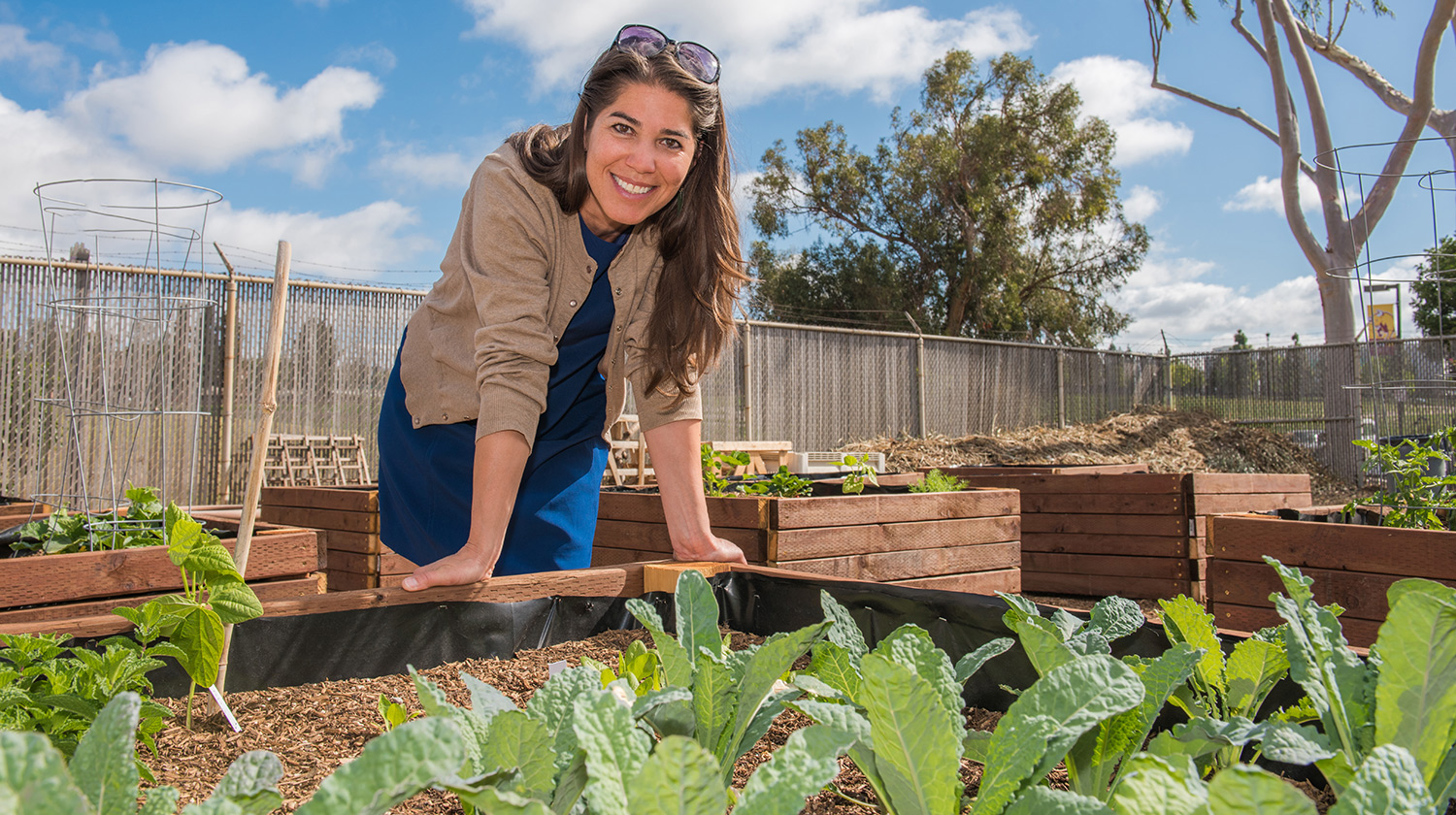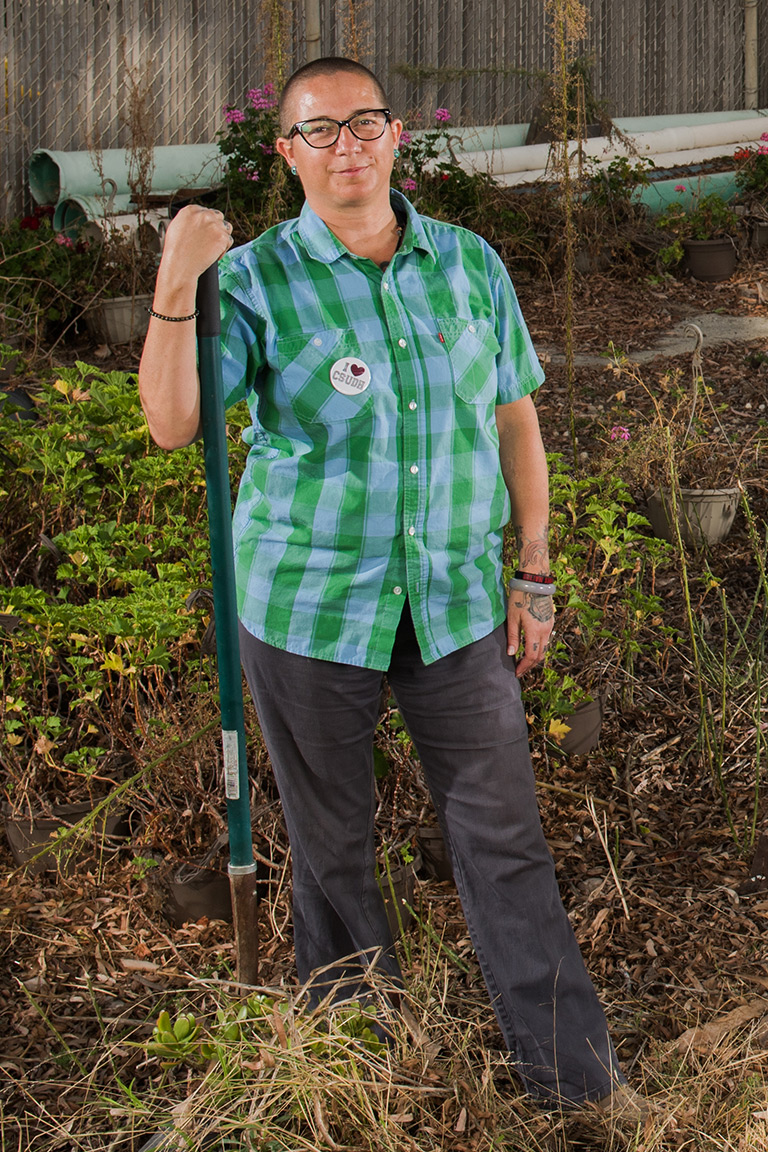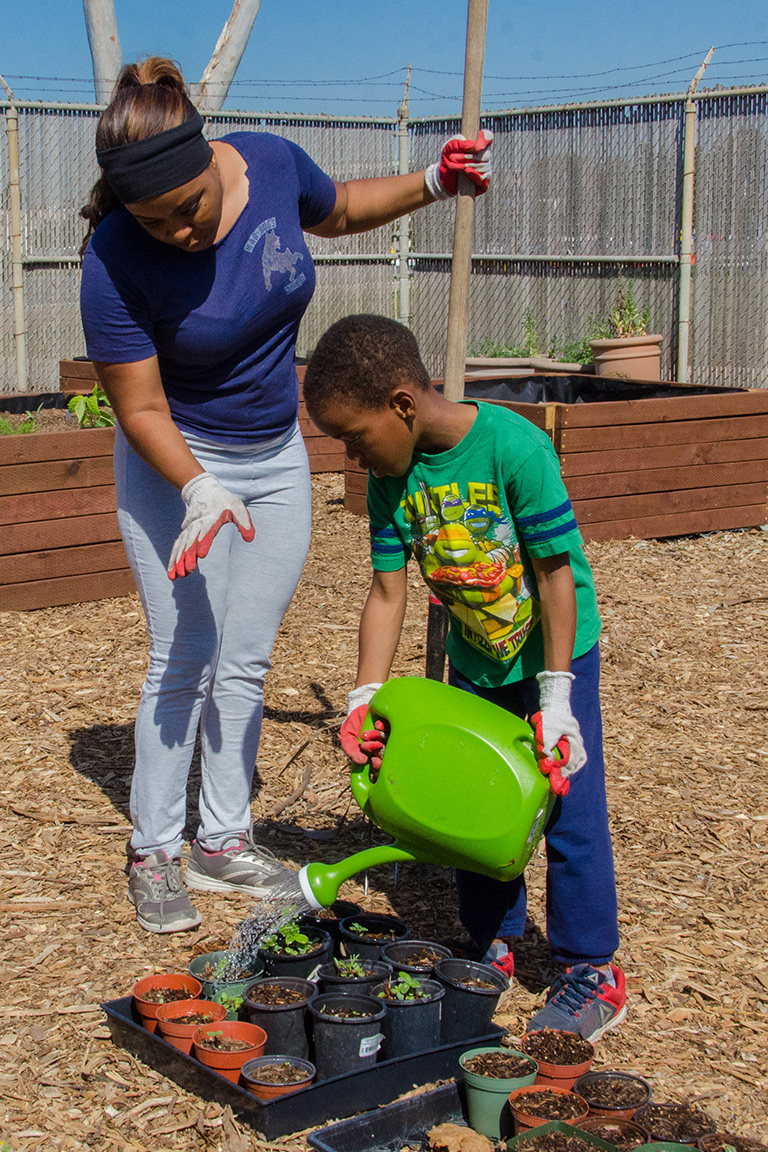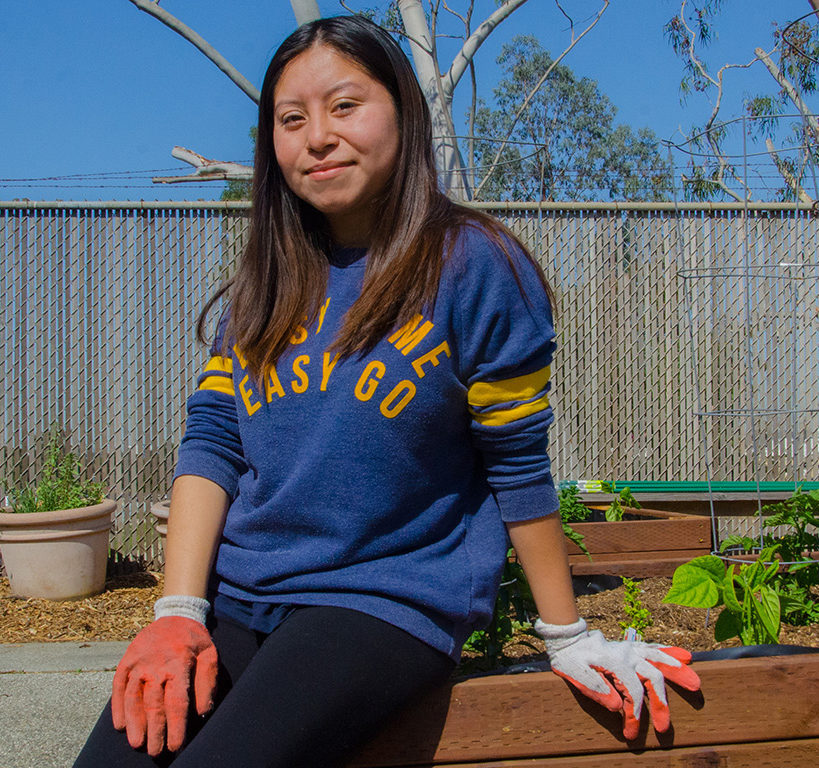
On a newly cleared plot of land on the southeast corner of campus, sociology major and Presidential Scholar Hawk McFadzen props up a tight bundle of plant material to show sociology student Martha Hernandez how to rotate a three-stage compost system to cultivate fertile soil for planting organic vegetables.

McFadzen is an intern and coordinator of California State University, Dominguez Hills’ (CSUDH) Urban Farm, which saw its first crops planted this semester. A multidisciplinary living laboratory, the farm provides a venue for faculty to engage students not only in organic gardening and urban horticulture techniques, but also in discussions about larger societal issues around sustainability, the environment, and access to healthy food choices in urban environments.
“One thing that we really want students to take away from the Urban Farm is the social aspect of it and how that relates to this city,” said Jenney Hall, a lecturer of Interdisciplinary and Environmental Studies and adviser for the student-led Farm Club. “There is a lot of food insecurity among students in the CSU system, because many campuses–particularly our campus–are located within a food desert. There are few grocery stores, farmers markets, or places to farm in this region. A good number of people in this area, particularly our students, are doing their grocery shopping at Walmart.”
The idea for the Urban Farm first took root when Hall and McFadzen discovered they were both advocating separately for a campus garden. They formed the student Farm Club in fall 2017 and enlisted the help of CSUDH Sustainability Coordinator Ellie Perry. In January 2018, Hall and Perry received a $13,000 CALL (Campus as a Living Lab) grant from the CSU Office of the Chancellor in support of the farm concept, which included stipends to hire McFadzen as a student intern. Additional funds were secured, and earth sciences major Alicia Salmeron was also hired.
While finalizing the plot approval, the Urban Farm staff hosted a well-attended Planned Edible Plant Garden Syllabus Workshop on Feb. 9 to seek feedback from faculty and engage them in conversations about curriculum development, in addition to sharing the concept of the farm broadly on campus.
The Urban Farm is open to the public weekdays from 7 a.m. to 4 p.m. During the Planned Edible Plant Garden Syllabus Workshop, the faculty shared specific academic program-based ideas for implementing the farm into curricula. They include: Women in Society, ecofeminism; Geography, ecology applications; Occupational Therapy: gardening therapy; Anthropology, ethnobotany; Philosophy, environmental ethics; Physics, testing hydroponic sensors; and English, environmental rhetoric.
“’What, we have a farm?’ is what I still hear once in a while, but the word is definitely out there,” said McFadzen. “When people find out about the Urban Farm they become very excited, are very curious about how it fits into the university, and want to come out and take a look and get involved. It’s spreading fast by word of mouth, which is great.”
As the students get dirt under their fingernails, several CSUDH faculty are already participating and have developed farming projects. Faculty are also encouraged to develop grow projects with vegetables that relate in some way to what they teach and/or research. Several grow projects have already taken root in the farm’s 20 four-by-four-foot raised beds and are yielding a small bounty of tomatoes, squash, kale, strawberries, basil and more types of produce.

A salsa garden fills one of the course-themed raised beds. Assigned by Hall for her Global Food Production course, the salsa garden illustrates root-to-table gardening and is filled with all of the ingredients to make organic home-style salsa from mild and medium, to hot. “Nothing students can buy from the store compares to fresh garden salsa, and now they get to explore how it’s better for the environment in a multitude of ways,” said Hall.
Rotating compost, watering sprouts, and doing other chores at the farm is proving to be gratifying for students. After the farm’s location was approved by university administration, the staff held its first build day on March 31, inviting volunteers to come out and help construct the raised beds.
“We ask students what they want to eat, or are interested in eating, and what they can actually use,” said Hall. “We also have pots with herbs in them, and plan to plant raspberries and beans to grow up the back fence at the top of the [west] slope. We’re trying to get a diverse mix growing here.”
All produce grown at the farm, unless claimed by the bed user, will be distributed to on-campus entities that support food-insecure students. Additional produce may be given or donated to other non-profit groups. To help ensure the financial viability of the farm and support its operations the remaining produce may be sold to Campus Dining or to the campus at-large during fundraisers.
Future plans for the Urban Farm include building planters in horizontal rows along the west slope to expand their crop yields and instructional resources. The farm also includes a large wooden shed that will be refurbished to possibly house an office area and/or better storage. An outdoor space behind the shed will increase the farm’s learning potential after it is converted into a lecture area where farm staff and faculty will organize presentations, demonstrations, and documentary screenings.

Hernandez, who lives in South Los Angeles, is helping out at the farm as a class assignment. She has also spent a couple of Saturdays helping clean up the land and building the raised beds.
“I really enjoy this, even though it is mandatory to come here for my class. I’d come back even if it wasn’t a class assignment,” said Hernandez. “I think once students come, do some work, and start working the gardens, they’ll want to come back more and more. This is my first time farming. I’m learning a lot and I think I may plant a little garden at home.”
Hernandez’s experience is exactly what the Urban Farm planners were hoping for.
“We’d like students to just enjoy growing their own food. I can’t wait to hear stories about them putting out pots of tomatoes, peppers, or even strawberries on their balconies or back porches,” said Hall. “Our students will be helping turn food deserts into something better for our communities. They just need to learn how to do it.”